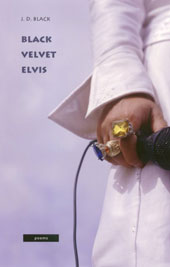The Porcupine's Quill
Celebrating forty years on the Main Street
of Erin Village, Wellington County
BOOKS IN PRINT
Black Velvet Elvis by J. D. Black
The King himself puts in a cameo appearance at a rural Quebec Gas-Bar de la Nuit where the glowing ends of several dozen cigarettes counterpoint an urgent bass line to the syncopated doo-wap of several tens of thousands of fireflies.
In this brilliant and unusual first book of poems, J. D. Black salutes The King not only with the occasional electric guitar but with stranger and more delicate melodies as well, a few strummed out on the dulcimer, others twanged along the nerves. Black reveals himself as a master of difficult forms extending from rondeaux and villanelles to mischievous haiku. But it would be mistaken to see him merely as a skilled traditionalist. Amid the high polish of the poems rough surprises abound. The menacing redneck Len surfaces in several ‘vignettes’, his beery but robust visage scarcely contained by the strict sonnets through which he elbows. In these sly poems, Len, resplendent in his white Cadillac or cursing the ‘sumbitch stepdaddy’ of his squeeze, contrasts sharply with the sad diminished figure of Elvis, moping in a Quebec ‘Gas-Bar de la Nuit’. Black moves expertly from witty light verse to elegies as graceful as they are moving. In ‘Last Train Out’ the sense of loss of a Holocaust survivor is evoked through an abandoned stamp album. In ‘Canis Lupus’, the wolf hidden inside the dog is unleashed. This is a dazzling collection of superb craft and subtle mischief by a poet whose work has for too long remained a private delight.
The King grins down from the gas station wall,
benignant presence over the cash register
blessing villagers and passing travellers
through cracked, grime-mottled, grease-streaked glass.
With this, his title poem, J. D. Black sets the tone, often ironic but never cynical, in this remarkable collection. In a broad range of topics, styles, and forms, all handled with impressive skill, Black explores facets of life ranging from the natural world, to human nature. Using forms, both lyrical and narrative, and approaches both idealistic and brutally realistic, he reflects life in all its manifestations. What is particularly gratifying, because it is so rare in poetry collections, is the clarity, the accessibility of Black’s poems. The subtlety, the brilliance, lies in the astonishing insights and the conviction of truth to reality which inform every poem. The reader’s reaction to each is, ‘Yes, right, that’s exactly the way it is.’ This conformance with reality is abetted by his very effective use of rhyme and metre, unfortunately rare commodities in modern verse.
In the title poem, he blends wry social comment with biography, and myth, all informed by a melancholy sense of failure and loss. A series of ‘Vignettes of Len’, snapshots of a squalid thug contrast dramatically with a lovely testament to the onset of Spring, and with a haunting elegy to a disappearing god of the forest, the wolf. The dark humour of a hapless factory worker losing an arm to the machine is followed by a description of stew, so vivid that one can taste it. And a Venetian glass-blower anticipating cuckoldry. And a Good Friday poem of Judas. This collection is truly dazzling in its range and uniform excellence. It signals the arrival on the literary scene of a formidable talent.
Table of contents
Part I
Last Page
Cori Spezzati
Murano Purgatory
Canis Lupus
Rural Landscape
Triolet: Summing Up
Rondeau: Perseverance
Lines Written upon the Computer
Repression
Vignettes of Len I
Vignettes of Len II
Interlude: Ira and Yvette
Vignettes of Len III
Vignettes of Len IV
Gang-Car Stew
A Song on Good Friday
Consubstantiation
Incident on the Plant Floor
Labels
Vivisection
An Informed Opinion
Antiheroic Couplets
Mrs Murphy Remembers
String
Connection
For Richard Outram
March Rhododendrons
Reply to Robert Frost
Black Velvet Elvis
Intermezzo
Don Jose to Carmen
Schlemil to Giulietta
Andrei to Natasha
Der Vogelfanger
Part II
Microcosm
From a Child’s Idyll
Rain in Autumn
Roundel: Awkward ...
A Trip Downstairs
Personal Geotechtonics
Almost-Circle
Lost Hope
Rude Awakening
Reflections
Echoes
A Proper Cup O’
Canis Lupus Familiaris
Nurture
Last Train Out
Wings
Riddles
Missing Definition
Epitaph for a Matriarch
Vinca Minor Vincit
Signatures
Attachment
Period Piece
Folk Ballad: A Farewell at Sunset
Double Dactyls
Revisionism
Villanelle: Heat
How this Dream of Running in the Dark Ends
Cheshire Cat
Review quote
‘The flashy cover is a delight to the eye, as a well-known iconic hand graces it. Elvis, the older one, not the young one, is an equivalent symbol of Black and his later development into prose. We may be seeing the old Elvis on the cover, but the hand grasps the microphone firmly; like the older Elvis, Black may be late to arrive, but he seems confident in all that he has learned along the way and what he has brought to the table.’
—Kindah Mardam Bey, lucid forge
Review quote
‘The poems in Black Velvet Elvis surprise twice. First by their distinctiveness, then by how they leave you unprepared for what comes next. To go from a gory workplace accident (‘Incident on the Plant Floor’) to a sly satire on fashionistas (‘Labels’) is to experience the invigorating diversity of J. D. Black’s first book.’
—Carmine Starnino, Montreal Review of Books
Author comments
Black Velvet Elvis was written between 2000 and 2005, and ranges from free verse to the strictly formal, touching various points in between. Aside from a brief excursion to the opera stage, and a few bows to folk tradition, the majority of the pieces are based on the author’s personal experiences and memories. A variety of tone is attempted, with some pieces frankly light and humourous, others preoccupied with mortality, particularly in the last section, which deals to a large extent with family and friends.
—J D Black
Excerpt from book
Black Velvet Elvis, or
Gas-Bar de la Nuit
The King grins down from the gas station wall,
benignant presence over the cash register,
blessing villagers and passing travellers
through cracked, grime-mottled, grease-streaked glass.
But other Elvises hang around the room, growing older
clockwise, from the fresh, dimpled rebel by the door,
to the worn and pudgy Elvis over the Coke machine.
That Elvis is the weight of the world incorporate --
weight he lifted from everyman’s shoulder
on endless nights and took to himself, so great
that it rucks the nap of the black velvet
that bears him. And that Elvis cries, tears
brimming from sorrowing eyes, as he grasps
the cold metal of the microphone,
knowing what must come to pass.
Locals coming in to gossip or pay,
or just to ask for the restroom key,
talk in hushed tones: he was never really dead;
he was resuscitated miraculously and lives,
hiding and waiting until the world is ready
for him to stage a comeback. Rumours
of sightings percolate like the muddy gas
station coffee (everyone scans the tabloids
in the big food store down the highway,
past the ornate immensity of the church).
They trudge out over scattered gravel,
twitch-grass and dandelions to pee,
dreaming of a final long muscle-freeing
step off a Greyhound bus to the Land of Grace,
barefoot pilgrims floating on bluegrass
to the shrine of the man who knew the thrill of their love,
who was more popular than the Beatles,
whom they saw crying in the chapel,
who sang the soundtrack to their lives.
At night the gas station draws small swarms of boys in tight jeans
to its bright, wide windows.
They drop change in the Coke machine
and take the bottles across rue Principale
to hang cool against the square, flaking wooden pillars
of the darkened general store. Behind them loom
dim presences of leather-palmed work gloves,
sun-faded overalls, fly-specked skillets.
Elvis watches them study the rolled cuffs
of their jeans, as girls in threes and fours flounce by,
giggling. The glowing ends of deep-drawn cigarettes
play bass to a syncopated falsetto doo-wop of fireflies.
Across the street, a clapped-out two-tone Chevy
with primer-covered body panels guns its motor.
Behind it, sequins on Elvis’s jacket glitter.
A native Montrealer, J. D. Black came late to poetry -- so late his juvenalia might be seen as the product of his second childhood. Someone has said that a poet’s early works are about other poetry and the later works about the early works. Given his first influences -- Johnny Jellybean, Miss Ellen of Romper Room, Sarah Binks and Adrian Mole’s Baz -- and his abysmal ignorance of contemporary developments, there may be some reservations about his later production. After stints as a railway service worker, heavy equipment operator and golf-course greenskeeper (among other things), he settled on a career working in libraries, where his attempts to absorb literature by osmosis have proved fruitless. He is currently honing his poetic technique so that he may attempt country-and-western and Broadway lyrics.
The Porcupine's Quill would like to acknowledge the support of the Ontario Arts Council and the Canada Council for the Arts for our publishing program. The financial support of the Government of Canada through the Canada Book Fund (CBF) is also gratefully acknowledged.





